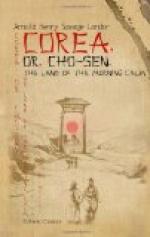The mile-posts on the high roads of Cho-sen are rather quaint, and should you happen to see one for the first time at night the inevitable result must be nightmare the moment you fall asleep. They consist of a wooden post about eight feet in length, on the upper end of which a long ghastly face is rudely carved out of the wood and painted white and red; the eyes are black and staring, and the mouth, the chief feature of the mask, is of enormous size, opened, showing two fine rows of pointed teeth, which might hold their own with those of the sharks of the Torres Strait, of world-wide reputation. A triangular wedge of wood on each side of the head represents the ears. The directions, number of miles, &c, are written directly under the head, and the writing being in Chinese characters, runs from up to down and from right to left.
It was pretty along the road to see the numerous little ponies, infinitely smaller than any Shetlands, carrying big fellows, towering with their padded clothes above enormous saddles, and supported on either side by a servant, while another man, the Mapu, led the steed by hand. The ponies are so very small that even the Coreans, who are by no means tall people, their average height being about 5 ft. 4 in., cannot ride them unless a high saddle is provided, for without these the rather troublesome process of dragging one’s feet on the ground would have to be endured.
This high saddle, which elevates you some twenty inches above the pony’s back, naturally involves a certain amount of instability to the person who is mounted, the balancing abilities one has to bring out on such occasions being of no ordinary degree. The Corean gentleman, who is dignified to an extreme degree, and would not for the world run the risk of being seen rolling in the mud or struggling between the pony’s little legs, wisely provides for the emergency by ordering two of his servants to walk by his side and hold him by the arms and the waist, as long as the journey lasts, while the Mapu, one of the stock features of Corean everyday life, looks well after the pony and leads him by the head as one might a big Newfoundland dog. The Mapu in Corea occupies about the same position as Figaro in the “Barber of Seville.” While leading your pony he takes the keenest interest in your affairs, and thinks it his business to talk to you on every possible subject that his brain chooses to suggest, abusing all and everybody that he thinks you dislike and praising up what he fancies you cherish, that he may perhaps have a few extra cash at the end of the journey, which he will immediately go and lose in gambling. He speaks of politics as if he were the axis of the political world, and will criticise the magistracy, the noble, and the king if he is under the impression that you are only a merchant, while evil words enough would be at his command to represent the meanness and bad manners of the commercial classes, if his pony is honoured by being sat upon




